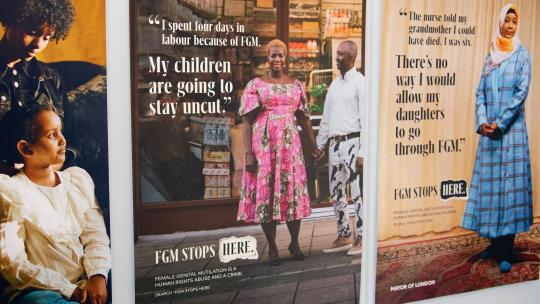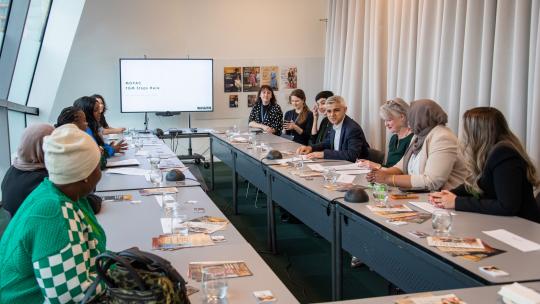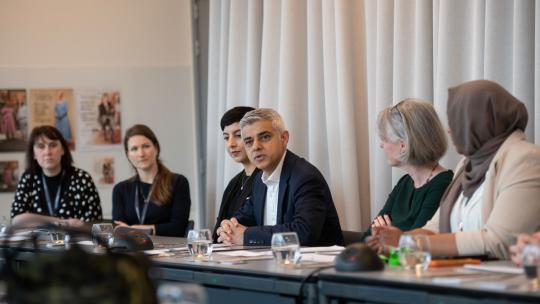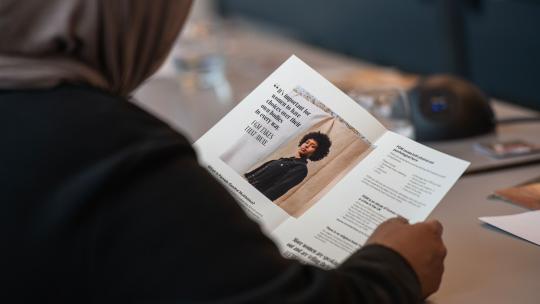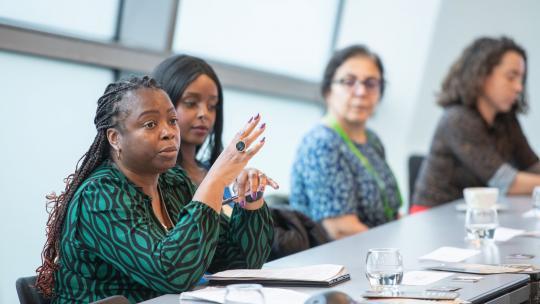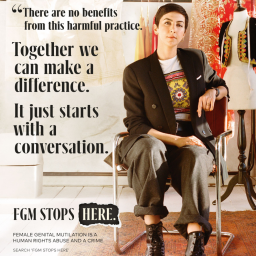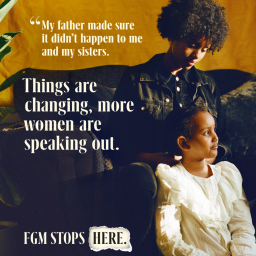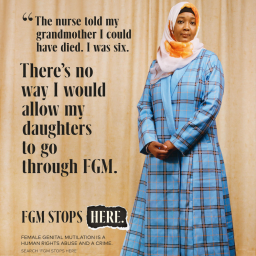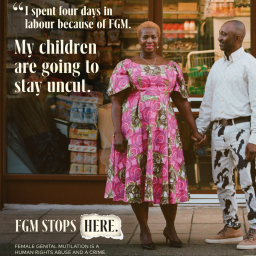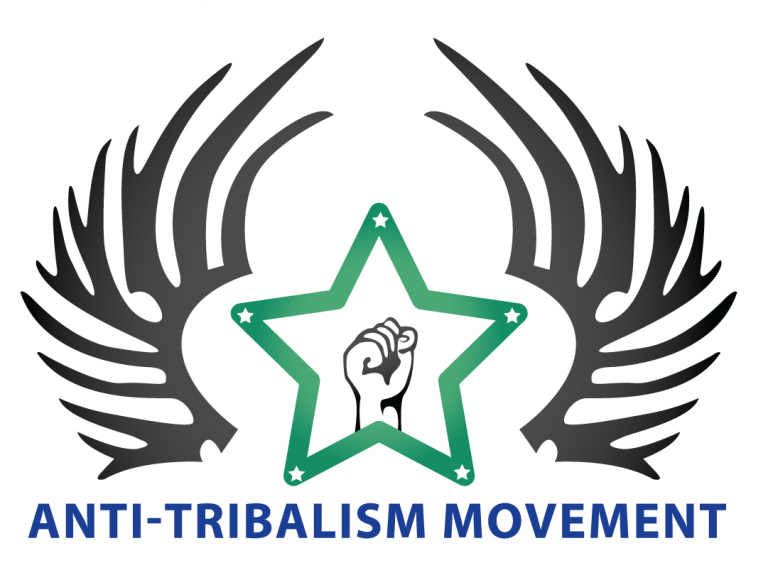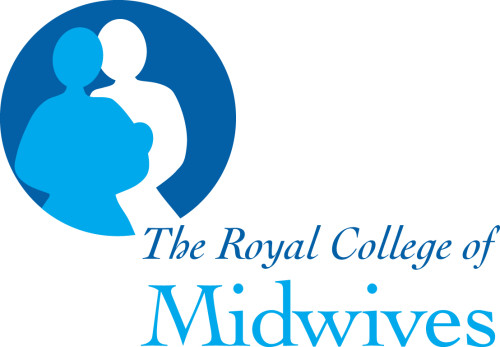FGM STOPS HERE
Our message is clear - #FGMStopsHere
What is FGM (Female Genital Mutilation)
Female Genital Mutilation (FGM) refers to any procedure that involves the partial or total removal of the external female genitals, or any procedure where the female genital organs are deliberately cut, injured or changed for non-medical reasons.
FGM is sometimes called “female circumcision” or “cutting”. Other local terms are: tahoor, khitan, gudnii, absum, ibi, bondo, halalays, sunna, kutairi or the “bondo society”.
There are no health benefits to FGM. It can cause serious harm and it has severe physical, psychological, and social consequences on girls and women's lives, that can be long-lasting.
FGM is an abuse of human rights, it is dangerous and a crime.
FGM facts
When FGM is performed on a woman she can experience serious and sometimes life-threatening health complications including severe blood loss, pain, infections, difficulties with childbirth. The effects can ongoing and be long-lasting. FGM can also be very emotionally damaging, triggering serious long-term trauma, depression, and difficulty with intimacy.
No religion, including Christianity, Judaism, or Islam requires girls to be cut and there is no evidence in any religious text that allows FGM to take place on girls and women.
All forms of FGM are considered child abuse and violate the human rights of girls and women. Under the Female Genital Mutilation Act (2003) and the Serious Crime Act (2015), it is against the law to:
- practice FGM in the UK
- take British nationals abroad to carry out FGM
- help anyone carry out FGM.
Those convicted face up to 14 years in prison.
Why FGM happens
The reasons why FGM is performed vary and can include a mix of sociocultural factors within families and communities and regions across the world.
- Where FGM is a social convention (social norm), the social pressure to conform to what others do and have been doing, as well as the need to be accepted socially and the fear of being rejected by the community, are strong motivations to perpetuate the practice.
- FGM is often considered a necessary part of raising a girl, and a way to prepare her for adulthood and marriage. This can include controlling her sexuality to promote premarital virginity and marital fidelity.
- Some people believe that the practice has religious support, although no religious scripts prescribe the practice. Religious leaders take varying positions with regard to FGM, with some contributing to its abandonment.1
Source: World Health Organisation (WHO) - Female Genital Mutilation
How London's communities are leading the fight against FGM
FGM survivors, family members, medical professionals and activists from across the capital’s diverse communities are speaking up against the devastating impact FGM has on the lives and wellbeing of survivors and their families, and saying #FGMStopsHere.
Playing this video will set cookies from YouTube/Google
"Let's just empower and encourage and uplift girls to be the amazing women that they will be. It just starts with a conversation."
Playing this video will set cookies from YouTube/Google
“All the women I interact with, we are all against FGM. Because we’ve seen what it has done to us. There’s no way, absolutely no way that we would allow our daughters to go through that.”
Playing this video will set cookies from YouTube/Google
"I'm hopeful that we are the last generation to be affected by FGM. FGM is not my culture."
Playing this video will set cookies from YouTube/Google
"We have young girls who are from cutting families who are saying no, my children are going to stay uncut."
What the Mayor is doing to end FGM
FGM is a life-threatening, painful, illegal practice that violates the rights of women and girls and that can have long-lasting consequences for their physical and mental health.
In addition to funding vital support services and early intervention work, the Mayor of London, Sadiq Khan, has joined forces with survivors and campaigners in community-led action to end female genital mutilation (FGM).
The Mayor’s VAWG Strategy sets out how City Hall is working with partners across London to take action to tackle FGM.
It is vital we have a public health approach to end the epidemic of violence against women and girls in London, to ensure it is treated with the utmost urgency – not just by the police but by society as a whole so together we can build a safer London for everyone.
Help spread the word that #FGMStopsHere
Together, we can put an end to FGM and empower women and girls to live their lives to the fullest.
Our #FGMStopsHere downloadable resources are free for you to use, and are a simple and easy way to help you start a conversation about the impact of FGM at home, at work and in your community.
By joining forces with London’s communities online, we can raise awareness about the impact of FGM and change the future of many women, girls and families.
Use the campaign hashtag #FGMStopsHere and share our videos on social media to show your support and inspire other people to act.
Playing this video will set cookies from YouTube/Google
Playing this video will set cookies from YouTube/Google
Playing this video will set cookies from YouTube/Google
Playing this video will set cookies from YouTube/Google
Playing this video will set cookies from YouTube/Google
Playing this video will set cookies from YouTube/Google
Playing this video will set cookies from YouTube/Google
Seeking help, advice and support
If you or someone you know is at risk of, or has been affected by FGM, help is available.
Alternatively, the following services may be able to help you:
NSPCC
Contact the NSPCC helpline on 0800 028 3550 or email [email protected] if you or someone you know is at risk of FGM.
National FGM Centre
Established in 2015, the centre aims to achieve a system change in the provision of services for children and their families who are affected by FGM.
FGM Clinics
National FGM Support Clinics (NFGMSCs) are community-based clinics that offer a range of support services for women with female genital mutilation (FGM).
Crimestoppers
If you have information on someone performing FGM or aiding cutting, you can contact Crimestoppers anonymously at 0800 555 111 or use their online form, available on their website.
For those who have already been affected by FGM, speaking to a support service can be the first step in understanding, and potentially treating side-effects of FGM, where possible. Talking to someone who understands what you’ve gone through can also be a very powerful way to deal with emotions or ongoing trauma.
If you’re a community leader or work with young or vulnerable people you should report FGM.
Known cases of suspected FGM in girls under 18 should be reported to police. Known cases are when a girl tells someone she has had FGM or it is seen by a professional in the course of their work. It is important to remember that all regulated professionals must report any known cases of FGM by calling 101.

